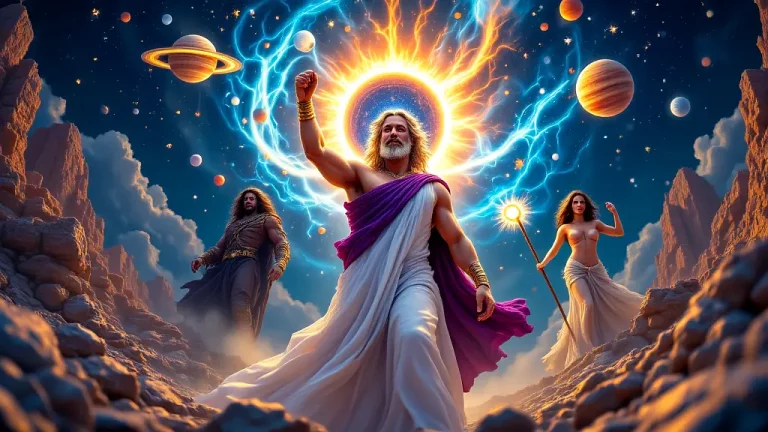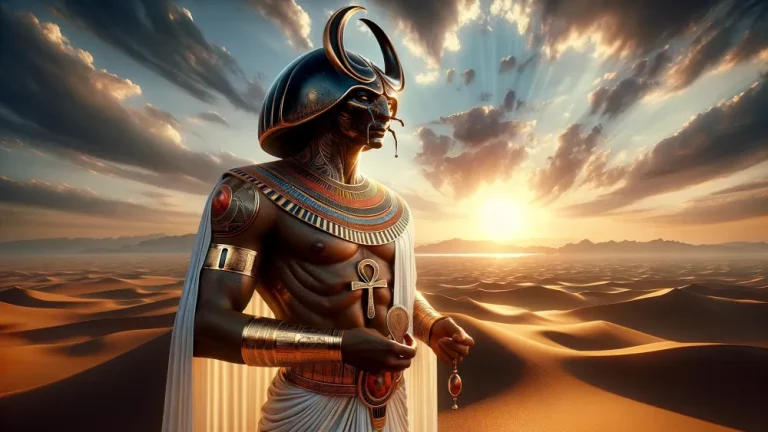Owuo In Akan Beliefs: Symbolism Of Death And Mortality
Death is something no one can escape, and it’s a part of life for all people. Every culture has its own way of thinking about what it means, and the Akan people, who live in Ghana and Ivory Coast, have their own understanding. They believe in Owuo, which is connected to death itself.
Key Points:
- Owuo is the Akan spirit of death, making sure people pass from life to the ancestral world.
- He does not harm or punish but exists because life must end for balance.
- He is connected to Nyame, the creator god, and Asase Yaa, the earth goddess.
- Symbols linked to him include black and red colors, vultures, and waterfalls.
- Akan funerals involve drumming, mourning, and offerings to help the dead move on.
- Death priests guide spirits and perform rituals for a smooth transition.
- The dead do not vanish but stay as ancestors, influencing the living world.
It is not an evil thing and does not act with cruelty, but it exists as part of the way things are. In many Western ideas about death, a frightening figure appears to take people away. But for the Akan, death is not just something that happens and ends everything. Instead, it is a step from this world to another, where ancestors exist.
The power that Owuo has is connected to Nyame, who is the god that created everything, and Asase Yaa, the goddess of the land. Both of them have power over life and over what happens when life ends. For a very long time, people have told stories that explain how Owuo first appeared in the world. These stories help people see what Owuo does when someone dies.
By thinking about these old beliefs, a person can better understand not just the Akan way of seeing life and death but also how many African traditions think about what happens when life is over.
Owuo: Overview and Key Facts
| Aspect | Details |
|---|---|
| Who is Owuo? | Owuo is the spirit of death in Akan beliefs and the one who makes sure people move from being alive to becoming ancestors. He is unlike the dangerous figures in some other beliefs, as he does not harm or act unfairly, but simply exists in the way that life requires. |
| Cultural Origin | People of the Akan group, who live in Ghana and Ivory Coast, believe in Owuo. He is a very important part of how they understand life and why people do not live forever. |
| Connection to Nyame | Some stories say death was not always there. Nyame, who created everything, decided that humans must not live forever, so he sent Owuo to make sure of that. |
| Relationship with Asase Yaa | The goddess of the earth, Asase Yaa, represents birth and living things. Since all people come from the earth, it is Owuo that makes sure their souls return after their time in the world is over. |
| How Owuo is Perceived | People do not think of Owuo as bad or as something that happens because of wrongdoing. Instead, he is part of life itself, and through him, the dead go on to join their ancestors (Saman), who still affect the world of the living. |
| Symbols Associated with Owuo | Owuo is connected to colors such as black and red. These colors mean mourning and the movement from life to death. Death-related images such as skulls, bones, and even waterfalls can also mean his presence. |
| Role in the Afterlife | Owuo takes no part in deciding if a person was good or bad. He brings them out of this life and into the next. The things they did in life will decide how they stand among their ancestors. |
| Differences from the Grim Reaper | People may fear the Grim Reaper in European stories, but with Owuo, things are different. He is not an enforcer, nor does he collect people’s souls. Instead, his job is only to guide them, making sure life continues. |
| References in Myths | There are many old Akan stories, and in them, people tell of how Nyame brought Owuo into the world. Some talk about how he deals with humans, while others even share the time that Ananse tried to escape death but did not succeed. |
| Influence on Funeral Traditions | To make sure the dead are respected and can move on properly, Akan communities hold long, detailed funerals. Drums, special acts of mourning, and pouring drinks for the spirits all take place because Owuo exists in every death. |
Getting to Know Owuo: The Akan Spirit of Death
If people want to understand Owuo in Akan thought, they need to know who he is, why he is important, and what role he plays in the way people think about life and death. He is not simply a figure of death; he has meaning in how life itself is understood.
The next sections will focus on where he comes from, what represents him, and his role in the culture. These ideas will explain how people think about him, what symbols are tied to him, and what effect he has on their way of seeing life and what comes after it.
Who is Owuo?
In Akan beliefs about life and death, Owuo is the spirit connected to dying, a powerful being that makes sure people move from this world to the place of their ancestors. He does not cause suffering or bring punishment, unlike other death figures from different beliefs. Instead, he is part of how life is supposed to function.
The Akan people think life and death are connected, forming a cycle that does not break. This cycle is under the power of Nyame, the highest god, who controls everything that happens. In many stories, it is said that death was not always there. But Nyame decided that people could not live forever and sent Owuo to bring death into the world.
Another god, Asase Yaa, is tied to Owuo as well. She represents the land and everything that lives. All people come from the earth when they are born. And because of that, when they die, Owuo makes sure they return to where they came from. Rather than being the last step, dying is something that must happen for life to continue.
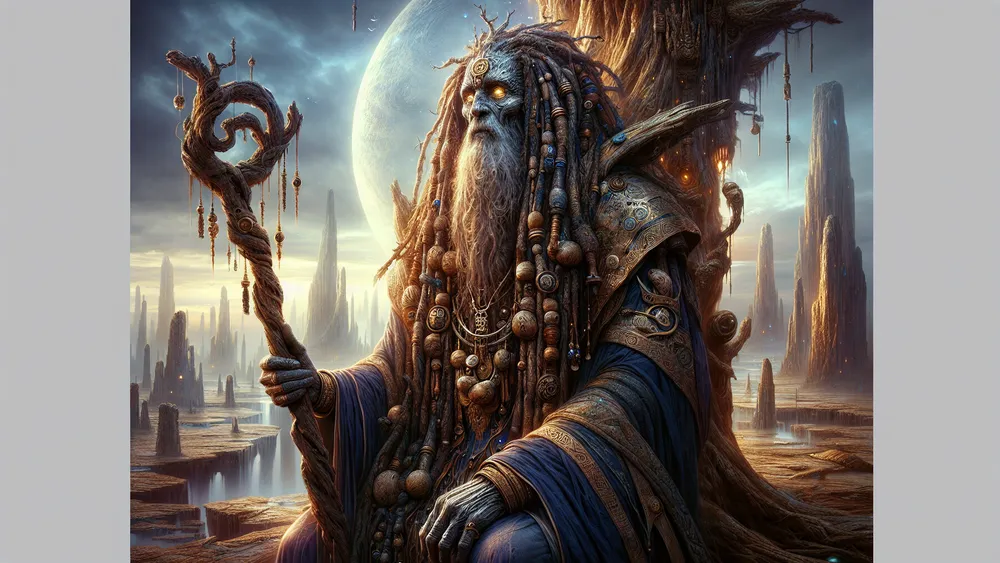
Because of this belief, many think that the dead are not gone but remain as ancestors, still connected to the living world in an essential way.
Owuo is the force that takes people to their ancestors when they die, not as punishment but as part of the natural cycle, which Nyame controls, ensuring that life and death are forever linked.
Owuo’s Place in Akan Beliefs About Life and Death
The Akan believe that life does not stop when a person dies. Instead, it is a change from one state to another, carried out by Owuo. Life happens in a repeating cycle – people are born, grow, die, and become ancestors. It does not move in a straight line from a beginning to an end. Dying is not the same as not existing.
It is something that must happen for the soul to take on a new form. In Akan beliefs, everything must stay balanced. Life and death, happiness and suffering, brightness and darkness – all of these remain connected. Owuo makes sure that this balance does not break, and his role is to take people from the world of the living to the world of spirits. People do not stop being when they die.
They take on a different form and still have a place in the world. Because of this, Owuo is not thought of as something to fear. He does not harm, nor does he punish. His only role is to do what must be done. When someone dies, they do not disappear. Owuo takes them where they need to go – to Saman, the world of the ancestors.
Those who lived well take their place among the Samanfo, the honored dead, who guide their families, help them, and watch over them. They give wisdom, protect their descendants, and remain a part of life. But not everyone reaches this place. Those who did not live correctly or failed to follow the moral ways of their ancestors may not be accepted.
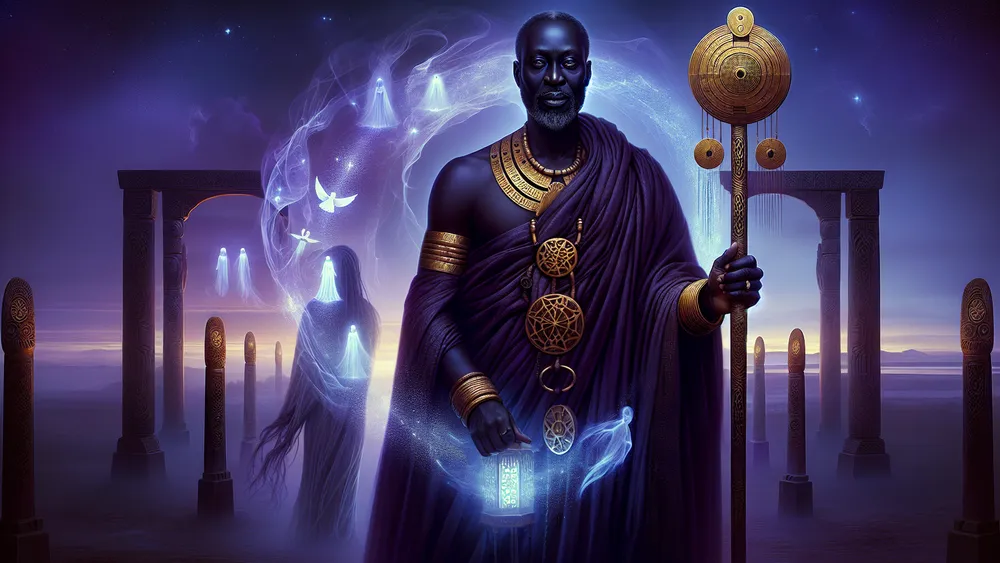
Instead, they become spirits without a home, wandering without order. Owuo makes sure that every soul arrives at the right place, whether among the ancestors or left outside of their world. This understanding of death makes it clear why the Akan focus so much on living in the right way.
Funerals, gifts to deceased family members, and ceremonies help the dead make their journey as they pass from life to being among the ancestors. These actions keep the connection between the living and the dead strong, showing how Owuo’s role continues even after life is over.
Symbols and Images of Owuo
Symbols and pictures are very important in Akan beliefs because they help people understand gods and powerful forces, including Owuo. Certain colors, things in nature, and even animals are connected to him, each helping to explain what he means in the Akan way of thinking. Owuo is often linked to dark colors, especially Black and Red, because these colors have meanings tied to grief, change, and what people do not know about death.
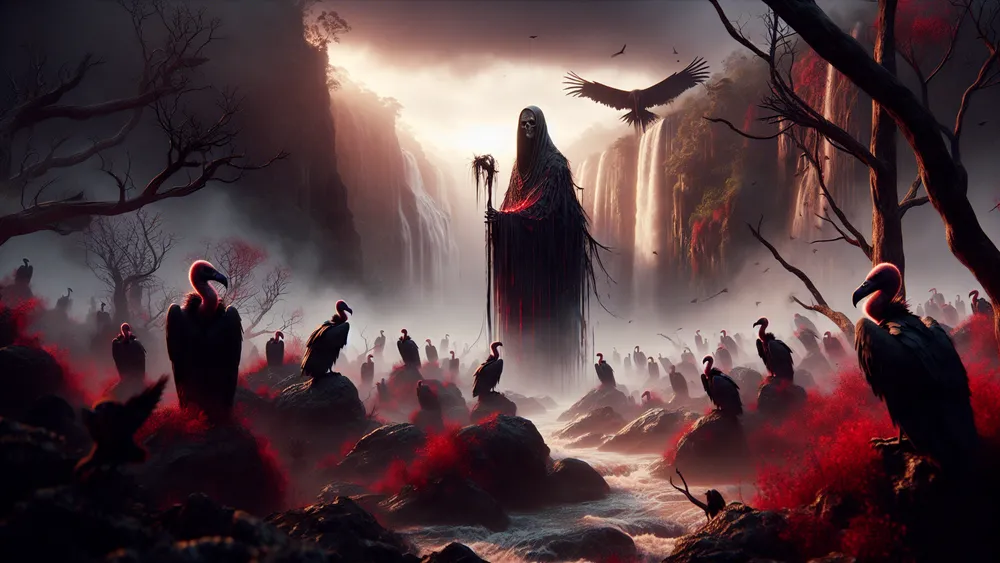
Black means emptiness. It is also tied to what cannot be seen in death and the journey of the soul after life. Red is different. People wear it at funerals because it is connected to pain and how dying changes a person. Some say Owuo is connected to things in nature. For example, a waterfall only moves in one way – just like life, which does not turn back once it reaches death.
Others look at vultures and connect them to him, since these birds are always around when something has died. Some believe that when these birds appear, it means Owuo is nearby. Not every group thinks of Owuo in the same way. Some believe he has no face, only a dark shape, which means he is neither good nor bad – just something that must happen.
Others do not see him as any kind of figure at all. To them, he is simply a force that exists, not a person, and his presence is only felt through what he does.
The following symbols are connected to Owuo:
- Colors: Black (emptiness, mystery, the spirit world), Red (pain, how death changes people)
- Natural Elements: Waterfalls (life moving forward, unable to return)
- Animals: Vultures (death, dying things, change)
- Abstract Ideas: A dark shape, no face, a thing that cannot be seen but still has power over life and death.
Legends and Tales About Owuo
In Akan beliefs, there are many stories about Owuo. Some explain where he came from, and others tell about what he does in the never-ending cycle of life and death. People have told these stories for a long time. They explain that Owuo cannot be stopped, and they teach about life, destiny, and what happens when people try to avoid death.
For a long time, people have told stories about Owuo. Each tale teaches something. They speak of Owuo and how nothing stops him. Yet, they are also about the things people learn – life, destiny, and the ways people try to escape death, even though they cannot.
The Story of Owuo and the First Humans
The Akan tell of a time when people never died. Nyame, the one who made everything, created the first humans, and they lived forever. They did not grow old. Pain did not come. They were always there, and nothing ever truly changed. At first, this seemed good. But then the world became crowded. And people? They did whatever they wanted, because they were not afraid.
Nothing could end them. Life went on without limits, and because of that, it lost its value. Some stopped listening to Nyame. Others forgot the laws of Asase Yaa, the Earth herself. Nyame saw that things were not right. He knew this could not continue. A force was needed, something to bring balance back. That is when he sent Owuo to change the world. Some stories say that Owuo did not want this job.
It would make people afraid of him. They would hate him. But there was no choice – he had to do it. Then Owuo came. From that moment, nothing stayed the same. People grew weak. They became sick. And for the first time ever, they died. Their families saw them lying still, no longer able to speak or move. Grief spread across the world.
No one understood why their loved ones were gone, why they could not return. Many of the old stories say people begged Nyame – take away death, bring back what was before. But Nyame would not undo it. He told them that dying was now a part of how everything worked. Without it, life had no meaning. Without it, there would be no ancestors, no spirits watching over the living.
Because of Owuo, the idea of Saman, or the spirits of the dead, became part of life. Once dying became something that happened to everyone, people also realized that it was not truly the end. The dead were not simply gone. They had moved to another place, one that was unseen but still connected to the world of the living. In time, the Akan created ways to help those who passed on.
Funerals were held. Rituals were performed. People made sure that the journey from life to the spirit world was smooth. And so, Owuo was no longer just something to fear. He became a part of what kept everything moving, ensuring life and death remained connected.
Owuo and the Trickster Ananse
Ananse, a spider who is both clever and tricky, has many stories about him in Akan tradition. He thinks fast, tricks others, and always finds ways to get what he wants, even from those stronger than him. He believes he can do the impossible. Then he sees Owuo come for people, one after another. He watches. And he makes a plan – many, in fact. He will not let this happen to him.
One story tells how Ananse spun a massive web. He believed that if he could trap Owuo, he could stop dying from happening. Another story says that he climbed the tallest tree, hoping death would not find him there. Or one where he dug deep underground, where he thought he would be safe. Each time, his plan failed. No trick worked. No matter where he went, Owuo was there.
Always waiting. Always watching. One version of the story says something different. This time, Ananse is no longer so sure of himself. He is desperate. Instead of running, he tries to make a deal. He offers something in return for never having to die. What does he offer? All the wisdom in the world.
He says that he will gather every bit of it, put it in a pot, and give it to Owuo. And then Owuo will let him live forever. But something goes wrong. The pot falls, breaking open. All the wisdom spills out. Owuo is not moved. “Everything must die when the time comes,” he says. And that is the end of it.
This story teaches something important in the Akan way of understanding life. No tricks, no plans, nothing can stop death from happening. Even the smartest, most deceitful being in all the stories could not change it.
The River of Souls: How Owuo Guides the Dead
In Akan belief, death is not the end. It is a change. The soul must move from one world to another, and Owuo has a vital job. He guides souls on their way. Some say that when a person dies, their soul must cross a wide river. On the other side? The world of ancestors. This river is not small.
It is great, and no one knows exactly where it leads. It separates the world of the living from the place of spirits. Across this river, the world changes. The side before it? The land of the living. The other side? Where ancestors wait. In some Greek stories, a man on a boat carries souls across a river.
But in Akan belief, it is Owuo who makes sure every soul gets to where it belongs. Not every soul has an easy time crossing. The ones who lived well? Their journey is smooth. But those who did not? It is not simple. Since no one can avoid this journey, people perform burial rituals to help the dead prepare.
Many things are done – drums are played, words are spoken, and liquid is poured out as an offering. These things help the dead reach where they need to go. Sometimes, small objects are placed with the body. Some believe these are needed for the journey. People wear black or red when mourning. These colors mean loss, but they also remind people that life and death are connected.
When a person has gone across the river, people believe they stay connected to the world. They become part of the Samanfo, the spirits of ancestors. They do not vanish but remain, watching over the living.
The Akan believe death is not an end but a shift, where souls cross a great river to join the ancestors, guided by Owuo, with burial rituals helping them on their journey.
How Owuo Compares to Other Death Spirits and Gods
Owuo is important in Akan beliefs about death. But in other places, different gods and spirits take that role. Each culture has its own way of thinking about death. Some believe in gods who decide what happens next. In others, spirits watch over the dead. Some spirits are like Owuo. Some are not.
People across the world have different ways of thinking about death, and many of them explain it through gods or spirits. When you put them side by side, you see what they share. If you place Owuo next to spirits from other beliefs, you notice their differences. But also what connects them. Some tell of gentle guides. Others speak of powerful rulers.
Owuo vs. Anubis: A Side-by-Side Look
Owuo and Anubis both have to do with death, but they are not the same. Some things about them are different. Others are not. In Akan belief, Owuo is death itself. He does not judge people. He does not decide anything. He just makes sure that life ends.
His role follows the order of things, keeping life and death the way the world was made by Nyame. Anubis, on the other hand, does not only bring death. He has other tasks too. He protects the dead, leads their spirits, and plays a part in deciding where they should go.
He weighs the heart of the dead and checks if it is lighter than the feather of Ma’at to see if they may enter the next life. How people think of Owuo and Anubis helps explain what they do. Owuo is not usually thought of as something with a face or body. Instead, people connect him to darkness and the point where life stops.
He is not often drawn but is remembered in words and ideas. Anubis is different. People see him as a god with a jackal’s head, which means that he protects the dead and prepares their bodies. Owuo makes sure people die, and that is where his role ends. But Anubis is different because he also deals with the dead in other ways. He moves souls through the world of the dead and judges them.

In Akan thought, ancestors matter a lot in what happens after life. But in Egyptian belief, getting judged is more important.
Here is a table that puts their differences side by side:
| Feature | Owuo (Akan) | Anubis (Egyptian) |
|---|---|---|
| Role | Owuo is death itself. He makes sure that it happens. | A guardian of souls who also decides their fate. |
| Symbolism | Linked to endings, darkness, and nature. | Connected to protection, mummification, and judgment. |
| Depiction | Not drawn, mostly talked about in sayings. | A jackal-headed god that represents watching over the dead. |
| Interaction with Souls | Makes sure they leave the human world. | Judges them, guides them, and sends them to different places. |
Owuo and Mawu-Lisa: Death in Other West African Stories
In Dahomey stories, Mawu-Lisa is a god with two parts. One part brings life, and the other brings death. Mawu is one part of the god. The part of cold and the moon. The rest? That is Lisa, the part of heat and the sun.
One is tied to peace and birth, while the other is linked to power and strength. Together, they keep things in order because if there is life, there must be death too. That is how the world is, and Mawu-Lisa makes sure of it. This belief in West Africa means that life and death always go together.
That is like the way Owuo works in Akan belief. Death is not an end. It is just what must happen. Owuo is death. That is all. But Mawu-Lisa is not only death. Mawu-Lisa is also birth. Mawu-Lisa means life starts and life ends. The sun goes down, and later, it comes back. Owuo is in charge of making sure every person reaches death, like they are supposed to.
Owuo and Mawu-Lisa are not the same. But they both mean one thing: death is something that happens. No one can stop it.
How Owuo Differs from Greek and Norse Death Gods
People often think of death as a place with rules, controlled by a god. That is true in Greek and Norse stories. Hades and Hel both rule over places where dead people stay. Hades rules the Underworld. Different souls go to different places. Good people to one. Bad people to another. The place never changes. The dead stay there forever. In Norse stories, Hel is in charge of one area for the dead.
But she does not control anything. They are just there. She does not judge them, and she does not send them elsewhere. Hades, however, keeps things in order. Both gods have control over a set place for the dead, which means people believe that the afterlife does not change. Owuo is not the same.
He is different. He does not control a place for dead people. He only makes sure they die. He is not watching over them after. In Akan thought, there is not just one place where dead people stay forever under a god’s rule. Instead, they are with the Samanfo (ancestral spirits). Death does not mean everything stops. It is a passage to the world of the Samanfo. The dead do not disappear.
They stay connected to the people still living. They are remembered and can still have an effect on the world. Hades and Hel are different because when people die under them, they remain separate from the living. But Owuo is only the reason death happens, not a ruler who keeps people away forever.
Rituals and Traditions Connected to Owuo
In Akan thought, Owuo is important when it comes to death. That is why people made different rituals over time. Over time, different ceremonies became part of Akan beliefs. They are important because Owuo deals with death. These traditions respect the dead. They also help connect the living to their family members from before. To respect the ones who have died, these traditions are followed.
They also help the living stay connected to the ones before them. Owuo brings death, but people do not just let death happen without doing anything. They follow customs that help the dead move from this world to the next.
Akan Funerals and Ceremonies Honoring Owuo
In Akan thought, death is not just leaving. It is going to be with the ancestors. That is why funerals follow certain traditions. People do not think of dying as the final step. Instead, it is a movement to another place where the ones who came before exist. Someone dies. Then, the community comes together.
They follow certain customs that help the soul move to the next place. The body must be treated properly. People wash the body and put fine clothes on it. That is important because the dead must look right in the spirit world. People do more than that. They pray. They speak to the ancestors. They ask them to accept the new soul. The funeral itself is not small or short.
It lasts for days. There is talking – people remember what the person did in life, and they listen to stories about them. This matters because the dead person is gone from this world, but they still exist in another. Akan funerals have many traditions. Some of them include drumming, pouring drinks as offerings, and people mourning together, all done in ways that have meaning.
Musicians play drums. The beats mean something, not just to the people still alive but also to spirits. Different rhythms mean different things. Sorrow. Memory. A proper send-off. One more important part is giving offerings. People pour water or alcohol on the ground.
They say names of family members who have passed away before and ask them to help the new soul in its journey. People do not grieve alone. They cry loudly together, they sing, and they dance because mourning is something everyone does as a group. These traditions mean that death is not ignored. People follow them to help the dead go where they should.
Death Priests and Spiritual Guides
Death priests are important. They help the souls of people who die and also keep in touch with Owuo and the ancestors. They stand between the living and the dead, making sure things happen in the right way. The ones who are trained for this do special ceremonies. This helps the dead go from the world of the living to the world of spirits.
They do more than that. They look at special signs that mean someone will die. They also talk to spirits and help families calm spirits that are not at peace by doing ceremonies. Death priests do special things like singing, playing drums, and giving things away so they can talk to the spirits and ask for help. At certain times, some priests enter a different state.
When this happens, they say things that come from spirits. Families listen. They hear words from the people who have died. They are like people in other places who also talk to spirits. They help when spirits are not at rest. Some spirits may not have passed over properly. The priests take care of this.
They also know what people should not do when it comes to spirits and death. They make sure burials happen the right way, so Owuo and the ancestors accept them. This means that life, death, and what happens after are all closely linked in Akan thought.
Death priests guide souls to the spirit world, perform ceremonies to calm restless spirits, read signs of death, communicate messages from the dead, and ensure burials are done properly so everything stays in balance.
Akan Spirits of Death and the Afterlife
In Akan beliefs, Owuo is not the only spirit that has something to do with death. There are others. These include ancestor spirits (Samanfo) and nature spirits that affect what happens to the dead. Samanfo are important spirits from past family members. They still connect with the living, helping them and keeping them safe.
But this only happens if people remember them and perform the right rituals. Certain spirits have a different role. People believe some spirits stand between the dead and their final place. They help souls move to where the ancestors are. But some do not leave. They stay because something was not done right when they died. Funeral ceremonies are important.
If they are not completed properly, some spirits do not rest. These spirits, together with Owuo, mean that death is not the last step. Instead, it is a change into something else. Other African gods exist outside of the Akan tradition. You can see a list of them here.
FAQs
1. How does Owuo’s role differ from Western concepts of the Grim Reaper?
Owuo’s role differs from Western concepts of the Grim Reaper because he is not merely a harbinger of death, but a cosmic force that facilitates the transition of souls into the ancestral realm in Akan beliefs.
2. Is Owuo worshiped in modern Akan spiritual practices?
Owuo is not explicitly worshiped in modern Akan spiritual practices, but he is respected as an inevitable cosmic force acknowledged through funeral rites and ancestral veneration.
3. What offerings were traditionally given to Owuo?
Offerings traditionally given to Owuo often included drinks like palm wine, animal sacrifices, and symbolic items associated with death to appease his presence and ensure a smooth transition for the deceased.
4. How does Owuo determine when a person must die?
How Owuo determines when a person must die is believed to be tied to the individual’s destiny (Nkrabea), which is assigned by Nyame before birth and unfolds according to divine order.


